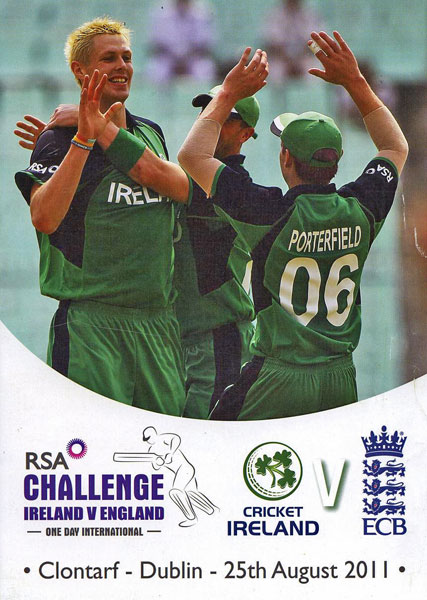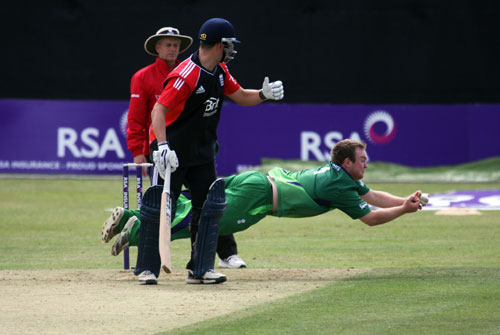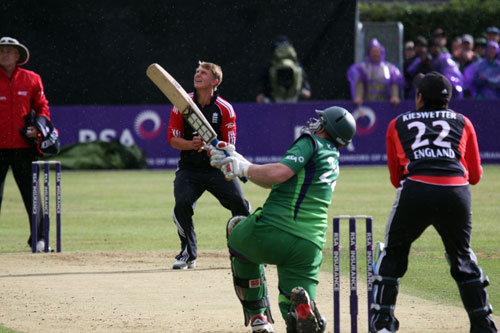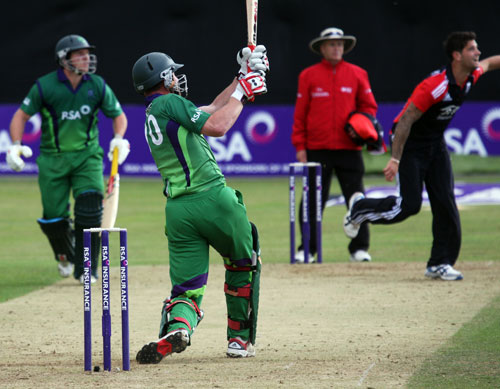


England's insistence on a 6pm cut-off so they could leave Dublin on an early evening flight meant that almost all the time lost led directly to the number of overs being reduced and the game ending prematurely with glorious sunshine bathing Castle Avenue. Ringed by temporary stands while still retaining its character, the ground looked magnificent and both the host club and Cricket Ireland didn't deserve to have rain ruin their big occasion. As it was, the first stoppage of over an hour reduced England's innings to 42 overs and the second limited the Ireland reply to a mere 23 and left them needing a daunting 87 off the remaining 10 overs under the Duckworth Lewis calculation. It felt like too tall an order and so it proved.
The wicket was never going to be as conducive to a run-fest as the track in Bangalore on which Ireland incredibly chased well over 300 to stun England at the World Cup earlier this year and hopes of an encore went with the bigger of the O'Brien brothers even though the incredibly improved John Mooney did his best to keep home hopes alive late on with one big boundary clearance. World Cup centurion O'Brien blasted successive sixes off debutant England leg spinner Scott Borthwick's only over before falling for 26, while earlier the explosive Paul Stirling had hoisted one out of the ground before hitting his third ball up in the air, but ultimately Ireland's reply fell flat.
 Paul Stirling takes a brilliant caught and bowled to dismiss Eoin Morgan
Paul Stirling takes a brilliant caught and bowled to dismiss Eoin Morgan
These truncated contests supposedly favour the side batting second by reducing their target in terms of the number of runs needed but the corresponding required run-rate rise brings pressure of its own and, as this writer has previously pointed out, these thrashes don't really suit Ireland in spite of possessing several big hitters. England's decision to field an experimental line-up featuring three new caps and missing most of their established stars had been criticised in some quarters as an insult but their selection was more of a nightmare which left Ireland in something of a no-win situation whereby a home win would attract little external credit yet still be desperately difficult to obtain.
For all the impressive progress Ireland have made in recent years set against England's relatively risible record in ODIs, in reality Phil Simmons' side still started as second favourites here against a country which has a massive player pool in comparison to their hosts. But if being beaten by what was effectively England's second string - though their two established stars did put on a crucial century stand for the third wicket - wasn't a great feeling, what really rubbed salt in the wounds was the fact that the visitors were led to victory by an Irishman with Eoin Morgan not only captaining their team but picking up the man-of-the-match award.
 Another six for Kevin O'Brien
Another six for Kevin O'Brien
It was Morgan who had denied Ireland victory on England's last visit with a key intervention in the field and this time he played the innings of the day - his 59 being better paced and much more attractive than the valuable but typically pedestrian contribution of 69 from the South African born Jonathan Trott. While it may sound like sour grapes to point out that only one of the visitors' first 100 runs came from an actual Englishman, it is nevertheless a fact and although Morgan got a good ovation from the capacity crowd in his native Dublin, his appointment as England captain for this game was a provocative, gratuitous gesture from the ECB and fears remain that he won't be the last player to be annexed by our big near neighbours.
Big Boyd Rankin, who played for the England Lions last week, and teenage spin star George Dockrell didn't do enough here to really catch English eyes but although it was six and out for Stirling, the youngster showed - just as he had at the World Cup - that his off-break bowling is a genuine second string to his bow and he took a magnificent return catch for good measure to dismiss Morgan. A sharp shower meant the early scheduled start being pushed back by 15 minutes to 10.30 but, to England's credit, unlike the West Indies at the same ground in 2007, they made every effort to get on the field as quickly as possible each time after the rain stopped.
Given the early start and inclement weather, Ireland captain William Porterfield had, unsurprisingly, inserted England upon winning the toss - the decision to field first here had nothing to do with the old formula of routinely letting any Test team that came to Ireland bat first for the sake of the crowd. With former captain Trent Johnston sidelined by a knee injury, Mooney was entrusted with the new ball and had wicketkeeper Craig Kieswetter caught behind before Rankin removed young debutant James Taylor who got a top edge trying to pull a short one. The bowlers had kept it tight early on with only 12 runs coming from the first six overs and when the rain returned England were 38 for two at the start of the 13th.
Morgan was warmly welcomed to the wicket and quickly started showing the crowd what Ireland are missing with a typically purposeful innings as he overtook Trott and reached his half-century first in a partnership which had realised 103 in 20 overs before being broken by Stirling. On a day that Porterfield rung a lot less bowling changes than he often does, the sixth and seventh men he turned to, Stirling and Johnston's replacement Nigel Jones, ended up bowling the most overs and deservedly so. Jones sent down nine, taking two for 32, while the young spinner had two for 46 in eight - very creditable considering he was kept on during the late powerplay.
However after a mid-innings wobble which saw Morgan, Ravi Bopara and another youngster Ben Stokes, fall fairly rapidly as England - who had left out Graham Onions and Jonathan Bairstow - scored 13 for three in the five overs following the drinks break, the lower order rallied with Samit Patel, Borthwick and Chris Woakes making nearly 50 runs between them at a good rate. Mooney, whose first five-over spell cost only 12, went for 20 off two on his return, including the final ball boundary which took England past the psychologically important 200 mark, though the couple of scalps late on helped his figures remain impressive - a return of three for 32. You feared the visitors might have plenty unless Stirling could last long enough to put Ireland in the box seat and take the pressure off everyone else.
However, having hit that six in Finn's first over, he holed out to Bopara and when Ed Joyce fell fairly cheaply Ireland had reached a fairly ponderous 42 for two off 13 overs when rain again forced the players off. As in the morning it was a double shower and the first scheduled resumption had to be put back. The cut-off for starting in time to get the requisite 20 overs in was 5.34pm and in the event hard work and a willingness to play meant three more were able to be fitted in. Having lost sight of where the ball went off his pad, Porterfield immediately ran himself out on the resumption but, with Ireland needing nearly nine an over, there was no better man to be walking to the wicket than Kevin O'Brien. His new book, reliving THAT innings, was on sale inside the ground and England were again the opposition but surely lightening couldn't strike twice?
 Six hit for John Mooney
Six hit for John Mooney
The crowd dared to dream as Big Kev sent the final two balls of Borthwick's over sailing out of the ground, prompting Morgan - whose opening bowlers Finn and Woakes were already through their reduced allocation of overs - to summon Jade Dernbach back at the City End and he crucially accounted for the O'Brien brothers in successive overs. Niall fell for 13 to a catch by Finn and Kevin was bowled to leave Ireland 77 for sixth in the 18th as Jones, surprisingly promoted to No 6, had been bowled by Bopara in between. Three wickets in three overs had emphatically swung the game England's way and there was a sinking sense of deja vu for the men in green. In the corresponding fixture at Stormont two years ago, England had also set Ireland just over 200 but a steady stream of wickets meant the home side fell short of their rain-reduced target.
Gary Wilson and Mooney put on a quick 20 before the latter was held in front of the sightscreen by Stokes off Dernbach with Ireland still needing 32 from the final three overs. Wilson went in the penultimate over, caught by Bopara off Patel, and inevitably the requirement of 19 from the final over proved beyond Alex Cusack and Dockrell. The sun shone now with the rain long gone but a few metaphorical clouds still hung over Clontarf as England left for the airport, minus Morgan who was staying in his native Dublin but is sadly lost to the Irish cause for the foreseeable future. On the day Ireland hadn't done enough for him to respond positively to a press conference question as to whether the men in green were now worthy of ODI series against the leading lights rather than one-off matches.
That is perhaps a harsh assessment but if Irishman Morgan didn't take the populist line in Dublin, you can be sure that the ECB and other super powers will be even less sympathetic to Ireland's interests or needs. Simmons' side sadly didn't further their claims here - but what the game certainly showed was that they need the extra exposure and experience which would come with being in these positions more often.
